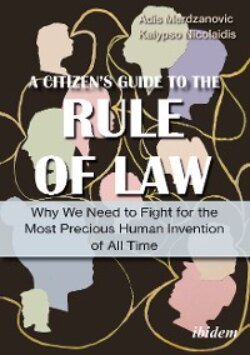Читать книгу A Citizen’s Guide to the Rule of Law - Kalypso Nicolaidis - Страница 19
What the people cannot decide
ОглавлениеThe connection between liberalism and democracy is not as straightforward as some might want to make us believe. A democracy rules by majoritarian means, 50%+1 vote decides. But the very idea of liberal government is that even what we call “the will of the majority” cannot override the basic rights of the individual. A form of compromise was necessary.
Historically, liberals understood that the very noble idea of self-government through democratic means could only be brought in line with their thinking when combined with a strong set of guarantees for individual rights and freedoms.13 These guarantees could not be given in special situations in which the problems arose, but had to be set beforehand, in principle and in perpetuity.
On the value of compromise
If you have ever been in a relationship you know that living together necessitates compromise, at times a lot of it. Be honest, do you really like all the things you have in your apartment? If you are reading this booklet at home, take a look around. How many of the things surrounding you do you actually like, and how many did your partner put there and you didn’t deem it worth having a fight over? By the way, we know such rather trivial realisations may be the one drop too many for a strained relationship. As we don’t really want to be responsible for your partnership breaking up, please, think about the larger happiness you get from the relationship to counter the subversive thoughts we may have just implanted.
It is out of this other—again very simple—idea, the notion of the rule of law was born. As a set of general, individual, human rights as well as certain rights and freedoms pertaining to the domain of governing and social order. The rule of law does not only formally limit government action in a particular way. When meaningfully employed, it also serves as a guarantee for human and individual rights against particular democratic and state decisions.
When the rule of law is absent, liberal democracy loses its “protective”14 aspect. We become dependent on the benevolence of others, in many cases of the undefined majority. Political rule becomes arbitrary.
If you are one of these people that likes to say what she thinks and take action to change things you deem unfair—as we pretty much hope you are—then you might find yourself in a tricky situation when the rule of law is absent. That is why we must act, to prevent any of us ever being put into such a situation!
1 For a detailed analysis of the EU’s reaction to the Yugoslav conflicts, see Josip Glaurdic, The Hour of Europe: Western Powers and the Breakup of Yugoslavia (Yale University Press, 2011).
2 See also Adis Merdzanovic, ‘A Sustainable European Integration Policy for the Western Balkans? Testing Five Common Assumptions’, in Western Balkans Back in Focus. How to Shape Europe’s Reengagement with a Region in Crisis, ed. Tobias Flessenkemper and Thomas Müller-Färber (Rehburg-Loccum: Loccumer Protokolle Vol. 28/2018, 2018), 9–26.
3 Deutsche Welle, ‘Youth Are Deserting Balkan Countries’, Dw.Com, 23 December 2016, https://www.dw.com/en/youth-are-deserting-balkan-countries/a-36891266.
4 See, for example, Florian Bieber (2020): The Rise of Authoritarianism in the Western Balkans. Cham: Palgrave MacMillan Pivot; or Jasmin Mujanovic (2018): Hunger and Fury. The Crisis of Democracy in the Balkans. London: Hurst & Company.
5 This is the classical definition of legitimacy provided by H.L.A. Harts. See Herbert L.A. Hart, The Concept of Law: With a Postscript Edited by Penelope A. Bulloch and Joseph Raz, ed. Herbert L.A. Hart and Penelope A. Bulloch (Oxford: Clarendon Press, 1994). For a discussion in the EU context see Vivien Schmidt, V. A. (2020). Europe’s crisis of legitimacy: Governing by rules and ruling by numbers in the eurozone. Oxford University Press. See also Teitel, R. G. (2001). Humanity’s law: rule of law for the new global politics. Cornell Int'l LJ, 35, 355.
6 Rainer Grote, ‘rule of law, Rechtsstaat and Etat de Droit’, in Constitutionalism, Universalism and Democracy: A Comparative Analysis, ed. Christian Starck (Baden-Baden: Nomos, 1999), 271; Friedrich August von Hayek, The Constitution of Liberty (Chicago: University of Chicago Press, 1978).
7 As exemplified for instance in Relocating the rule of law, whose various authors not only reinterpret the rule of law in the history of ideas, but as an ideal and a praxis in the here and now. See Gianluigi Palombella and Neil Walker, eds., Relocating the rule of law (Oxford: Bloomsbury Publishing, 2009).
8 Neil Walker, ‘The rule of law and the EU: Nexessity’s Mixed Virtue’, in Relocating the rule of law, ed. Gianluigi Palombella and Neil Walker (Oxford: Bloomsbury Publishing, 2009), 120.
9 Florian Bieber, ‘Patterns of Competitive Authoritarianism in the Western Balkans’, East European Politics 34, no. 3 (2018): 337–54.
10 Maja Zivanovic, ‘Poor Progress for Human Rights in the Balkans, HRW Report’, Balkan Insight, 18 January 2018, http://www.balkaninsight.com/en/article/balkan-countries-still-facing-old-human-rights-issues-01-18-2018.
11 John Stuart Mill, ‘On Liberty’, in On Liberty and Other Essays, Oxford World’s Classics (Oxford: Oxford University Press, 1869), 14.
12 John Locke, Locke: Two Treatises of Government, ed. Peter Laslett (Cambridge: Cambridge University Press, 1988).
13 Michael Freeden, Liberalism. A Very Short Introduction (Oxford: Oxford University Press, 2015), 26.
14 David Held, Models of Democracy, Third Edition (Stanford: Stanford University Press, 2006), 78.
Chapter 3
